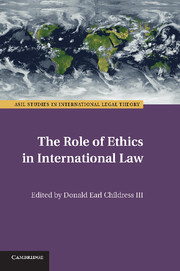Introduction
Published online by Cambridge University Press: 05 December 2011
Summary
In recent years, much has been written about public and private international law, albeit largely from either a public law or a private law perspective and not often enough from an integrative perspective. Drawing upon various strands of domestic, comparative, and international legal materials, international lawyers have created a field of specialization (international law) with two subspecialties (public and private international law) that arguably constitutes its own tradition and subtraditions with a specialized language for resolving legal disputes that cross national borders or implicate various sovereignties. According to Daniel Philpott, this theoretical and doctrinal development of the “international law tradition is dedicated to extending to the entire globe a set of commitments to which states give their active assent.” Thus, “a planetary ethic is the very point of the tradition.” These commitments are borne out in the legal argumentation undertaken by international lawyers. Put in a slightly different way, when we theorize about international law, we draw on ethical discourse to create an ethic of international law, both public and private, that seeks to resolve transnational legal problems.
This realization will certainly come as a surprise to many international lawyers given that international legal theory is largely free of explicit claims that international law and ethics are intertwined. In fact, international legal theory is more often susceptible to claims that law and ethics should be separated in international legal discourse. Few public and private international law scholars forthrightly argue for an engagement of the ethical dimension in international law because modern international law still largely exists under a spell of positivism, although there have been challenges to this orthodoxy in recent years.
- Type
- Chapter
- Information
- The Role of Ethics in International Law , pp. 1 - 8Publisher: Cambridge University PressPrint publication year: 2011



